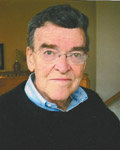August 28, 2012
Max’s Musings
 By Max Molleston
By Max Molleston
The only thought I have about Dylan Thomas is his superior poetry. All the busy talk about his drinking fades to nothingness, unless it is a stage of imbibing pushing to clearer thinking about the subjects of his lines, become poems. Thomas’ poem, The Hunchback in the Park, is a wordpicture of the treatment this gentleman gets, this deformed man, from young boys. Thomas takes an opportunity later in his poetic life, to talk about the poem as a place in his own youth, a youth in the park. A remembering: his town, his place in the park and thoughts and actions of the young lads.
The hunchback in the park
A solitary mister
Propped between trees and water
From the opening of the garden lock
That let the trees and water enter
Until the Sunday somber bell at dark,Eating bread from a newspaper
Drinking water from the chained cup
That the children filled with gravel
In the fountain basin where I sailed my ship
Slept at night in a dog kennel
But nobody chained him up.
Two of seven stanzas in the widely known poem. Dylan Thomas, who is quoted saying, “The face of the old man who sat summer and winter on the beach looking over the reservoir, I can see clearly now, and I wrote a poem long, long after I had left the park and the seatown.” (Swansea, in Wales) “We knew every inhabitant of the park, every regular visitor, every nursemaid, every gardener, every old man.” I enjoy the poem.
We were young with our eyes wide open and were carried away with thinking and acting in what then was an un-fettered existence of late childhood. No matter who we are and how many years have mounted up, most of us have been in a group of boys or girls “in the park.” The man titled in this poem was just one point for the constantly changing youngsters’ focus. Thomas concludes in this fashion.
A woman figure without fault
Straight as a young elm
Straight and tall from his crooked bones
That she might stand in the night
After the lock and chainsAll night in the unmade park
After the railings and shrubberies
The birds and the grass the trees the lake
Had followed the hunchback
And the wild boys innocent as strawberries
To his kennel in the dark.
This man, we suggest, may be compared to the role the late actor, Charles Laughton, brought to life in the classic movie The Hunchback of Notre Dame, written for the screen from the novel by author Victor Hugo. The poem itself is fairly complex. In the seven stanzas the cast of characters and the activities in the park pile up in the poem written from memory. That may be the way our own memories work from instances in our lives that impressed us. If you want to write down memories you had in childhood or other points in your life, please do.
As we move from what has been a record-setting hot and dry summer, let’s hope we have better memories. Time will tell, and time will take this columnn into the real fall, October, next month. Join me.
Filed Under: Personal Growth
Tags: Dog Kennel, Drinking Water, Dylan Thomas, Fades, Gardener, Gravel, Hunchback, Imbibing, Inhabitant, Late Childhood, Nothingness, Nursemaid, Poetic Life, Stanzas, Summer And Winter, Thomas Poem, Woman Figure, Young Boys, Young Lads, Youngsters
Trackback URL: https://www.50pluslife.com/2012/08/28/max%e2%80%99s-musings-36/trackback/


